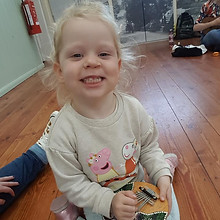Early Years Resources
Treble Time Youtube
A song resource for children and families, if you're after new repertoire, or just enjoy singing!
Blue Cabin This Is The Place Early Years Resources
On this page you will find:
This Is The Place Playlist - a collection of early years songs that were created by Carol Bowden and Katie Doherty, as part of a project for care experienced children and young people and their adults in Darlington called This is the Place. It is funded by Youth Music, County Durham Community Foundation, Creative Darlington and Darlington Borough Council.
Podcasts - Dawn Williams speaks to myself and Katie Doherty, and Eleanor Mooney and Ryan Humphrey.
The How's and Why's of Using Music In Early Years - a short film with myself and Katie Doherty.
The Thrive Playlist - We Make Culture's a collection of early years songs created and recorded by musicians Carol Bowden and Bridie Jackson.

We Make Culture Thrive Resources
We Make Culture‘s collection of early years songs has been created and recorded by musicians Carol Bowden and Bridie Jackson, as part of THRIVE, a partnership project with Wearside Women in Need. THRIVE explores the impact of embedding music-making activities in domestic abuse settings and aims to create positive, hopeful experiences for children, young people and mothers who have survived domestic abuse. This element of the project is funded by Youth Music.
On this page you will also find Blue Cabin This Is The Place Playlist.

Why Singing and Music Is Good For Your Little Ones?
Reading:
Levitin, D (2008). The World in Six Songs. New York: Dutton.
Trevarthen, C & Malloch, S (2009). Communicative Musicality. Oxford University Press.
Use music and singing for bonding and attachment, for their development, for guiding them through the day and remember, there are no hard rules to making music. Just be sure to sing a lot, you don’t need to be perfect, just be you. Use lots of repetition, bouncing and moving and have loads of fun.

Bonding & Emotional Development
Singing helps to strengthen speech development further and enhances feelings of closeness and emotional regulation.
Babies brains react to our voices when still in the womb, so it is never too early to start singing and making music with them.
Do this at home or, better yet, where you can play and sing together with others, support their development and make new friends.

Brain Development
Singing with children supports them in developing their listening and language skills, as well as learning about the world around them.
You can use songs to help them regulate their emotions, learn new tasks, managing behaviour and in developing routines.
Peekaboo songs are perfect examples of anticipatory play. It stimulates their senses, encourages social development, strengthens visual tracking and reinforces object permanence (even though they can't see, something still exists).




